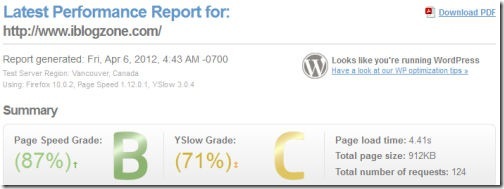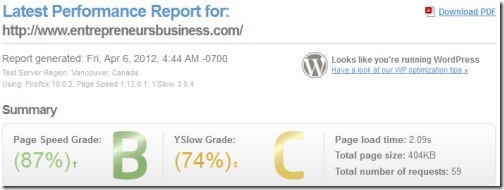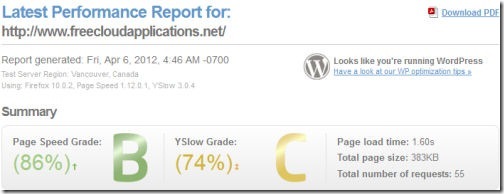- 50% of mobile users abandon a web page that takes more than 10 seconds to load (3/5 never to return).
- Amazon makes $67 million a day in sales. They could potentially loose $1.6 billion per year for just 1 second delay.
Anyway, what I am about to share with you today, is a result of various experiments I have been doing with my own WordPress powered websites. While this is somewhat different from the traditional “only free” stuff, I believe that come a time, whether we like it or not, we will most likely have to invest a bit, to achieve better results. If you are just starting your journey, or you haven’t done anything yet to improve your sites speed, then I suggest that you apply some of my recommendations on how to make your WordPress site load faster, first. If that is not enough, and you are really looking for a better option, then read on…
First things first. Test your page loading time. There is really no point of going further before knowing how long does it take for your site to load. There are many tools out there that will allow you to test for your sites speed, however, the following are the ones I recommend:
- Google Page Speed Online
- Pingdom Tools
- GTMetrix
- WebPageTest
The Essentials
Basically and from what I gathered from my research and experiments, site speed essentially boils down to the following:- server speed – the speed at which the page is served
- web page size – everything (plugins, theme, images, etc.)
- external calls – example: scripts from other sources, such as Google analytics
The Ingredients
My experiments were based solely on what I had my hands on, and only after applying all other site speed enhancements (see link above on making WordPress faster) as suggested. Obviously there could be other options to consider. However, if you are not sure what web hosting, theme, etc., to use, these could get you started.Websites: Aside from the obvious (this one), I tested two other sites, namely, freecloudapplications.net (FCA) and entrepreneursbusiness.com (EB). The later two are relatively new, but I did not save them from using all the SEO plugins that I like using
Cloudflare (Free CDN) – All experiments where conducted with and without Cloudflare. Final result indicated that all sites had an increased performance with CloudFlare on. Get yourself familiar with CloudFlare’s free CDN service, if you are not already. iBlogzone has been using CloudFlare for one year now and I am very happy with it. It’s free! There is a PRO option, but to be honest, I have not yet seen any reason why I need to upgrade.
Web Hosting – I have three accounts. BlueHost, iPage and HostZilla (cloud server). All are shared hosting, so investment is minimal, compared to other alternatives (e.g.: dedicated server). I have been on Bluehost (aff) for three years now and with the exception of the issue noted on my CloudFlare article, I have no complaints whatsoever. I have been on iPage (aff) and Hostzilla for nearly six months and so far, so good, no problems either. Actually, I started with HostZilla’s free Cloud Hosting (more info here) for the first two months and decided to upgrade to premium (ridiculously cheap).
Theme – Tested both sites (FCA and EB) on free and premium themes. I use Thesis here on this site and ended up with Genesis (aff) on the other two, that after testing a lot of other free and premium themes (e.g. HeadWay, Elegant Themes, etc.). Free WordPress themes are great but you should know how to choose them wisely. Many are poorly coded and some could even contain malicious codes, so research, test and apply. There is a new free theme, called Responsive, which is a great alternative. It is “responsive” (adjusts itself automatically depending on the device – great theme for mobile compatibility). Orion is also interesting.
The Results
Following are the test results (GTMetrix) that I ended up with the combination, CloudFlare + Theme + Web Hosting
iBlogzone: CloudFlare +Thesis + Bluehost
 Earningmoneyjobs
Earningmoneyjobs4,41s – Not bad, but still needs improvement. Note that my page size is somewhat big and the number of request are quite high. Nonetheless, it is hanging in that 4s threshold.
EntrepreneursBusiness: CloudFlare + iPage + Genesis
 Earningmoneyjobs
Earningmoneyjobs2.09s – Great. Note that the page size here is nearly half of iBlogzone and the number of requests the same. So to show you that page size and external calls makes a big difference. Entrepreneurs Business is an infographics site, so there are large images.
FreeCloudApplications: CloudFlare + Genesis + Hostzilla
 Earningmoneyjobs
Earningmoneyjobs1.6s – Great again. Page size is the lowest amongst the three. CDN + Cloud server is definitely fast. Hostzilla is relatively new, so if you want to take them for a test drive, it won’t hurt doing a bit more of research. Their free cloud hosting is the best out there, only limited by the disk space storage (100 mb), which can be easily lifted by going unlimited space ($15) or going Premium ($60 a year). Free Cloud Applications is just as the name suggests.
Conclusion
As you can see above, there is one common denominator, which is CloudFlare. You may or may not like it, but seriously, a free service like what they offer is hard to resists. Not only they boosts a sites performance, it adds security as well. And oh, you can also make money from their partnership with VigLink. An alternative to CloudFlare is Incapsula.
The options I covered, as I said, are those that I got my hands on, and there are several other themes, hosting providers, etc., that you can use. These options are effective methods for increasing the speed of your site, with minimal investment, but just like anything else, there is always more that you can do.
Are there any other cost effective methods you are doing that has proven to be successful? Please share your experience in the comments section!









